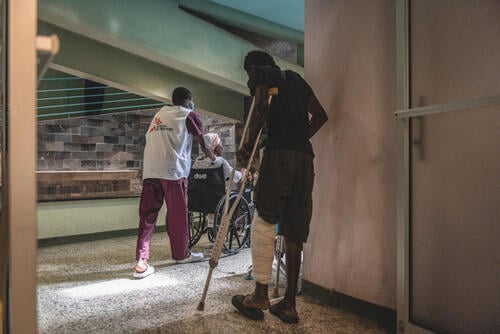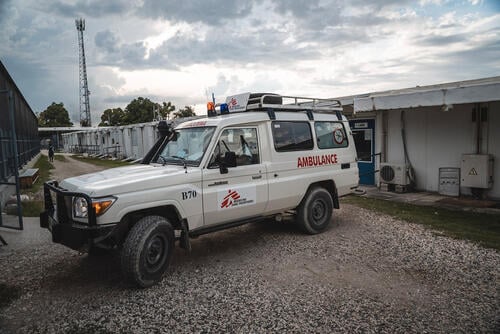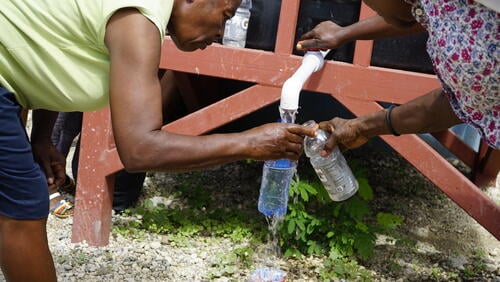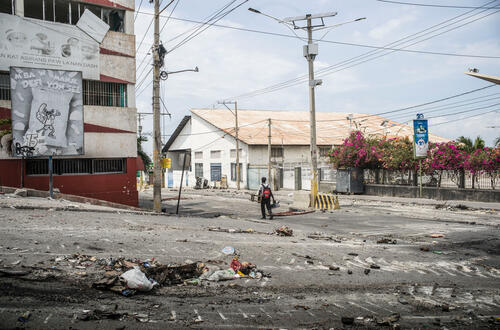The violence in Port-au-Prince, Haiti, has seen a new and dramatic increase since 28 February 2024, with armed groups attacking new parts of the city. This surge in conflict, occurring frequently in residential zones, has deeply affected the community and has seriously disrupted the healthcare system, which is struggling to remain functional.
At the Médecins Sans Frontières (MSF) Emergency Center in Turgeau, in the heart of the capital, numerous victims arrive daily for treatment as a result of the constant conflict.
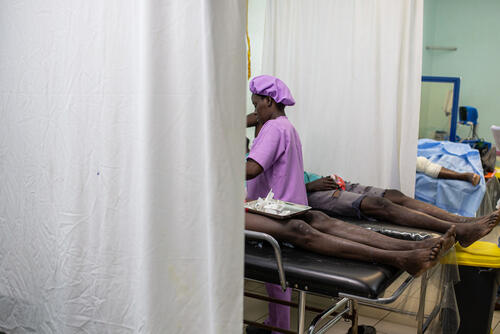
“Every day, we see the consequences of this violence,” says Robin Meldrum, project coordinator at the MSF Emergency Center.
“Just last month, one of the youngest patients was a three-year-old boy who suffered a gunshot wound to the neck – a stark indication of how indiscriminate the violence has become,” he says.
Healthcare services in Port-au-Prince are under severe pressure. The main hospital, l’Hôpital Général, is currently inoperable, situated within a conflict zone. Other hospitals are either facing similar challenges or are overwhelmed with the number of casualties, restricting their ability to accept new patients.
Even MSF’s Tabarre facility, specialising in trauma and burn care, is often at capacity, forcing it to focus only on the most severely wounded patients.
The urban environment in Port-au-Prince has transformed drastically, with deserted streets and fortified neighbourhoods becoming the norm, as residents try to shield themselves from the violence. This change has led to a notable decrease in emergency visits, with the centre in Turgeau seeing fewer than 40 daily patients, down from 80-100 in previous years.
Just last month, one of the youngest patients was a three-year-old boy who suffered a gunshot wound to the neck – a stark indication of how indiscriminate the violence has become.Robin Meldrum, project coordinator at the MSF Emergency Center
The insecurity has compelled many to alter their routines significantly. After being wounded by a stray bullet while selling vegetables, Maudeline, a local market vendor, now avoids the marketplace.
“I can no longer risk going to the market,” says Maudeline. “It's where I earn my living, but my safety is more important. Once I recover, I'll have to find a way to return safely.”
Amid these challenges, MSF staff like Windy, a health educator, remain dedicated to their roles, providing essential medical and psychological support.
“The city I knew is no longer the same. Our work now involves not only treating physical injuries but also addressing the mental scars left by constant fear and loss,” says Windy.
As Port-au-Prince confronts these turbulent times, our teams continue to play a crucial role in the community, offering care and support to those impacted by the violence. Their efforts underscore the resilience of both the medical teams and the residents they serve, highlighting the ongoing need for comprehensive support in this crisis-stricken city.
MSF has been present in Haiti for over 30 years, offering general consultations, trauma care, burn treatment, maternal and childcare, and support for survivors of sexual violence and displaced people.



